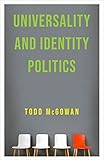Universality and Identity Politics / Todd McGowan.
Material type: TextPublisher: New York, NY : Columbia University Press, [2020]Copyright date: ©2020Description: 1 online resourceContent type:
TextPublisher: New York, NY : Columbia University Press, [2020]Copyright date: ©2020Description: 1 online resourceContent type: - 9780231552301
- 320.01 23
- JF799 .M345 2020
- online - DeGruyter
| Item type | Current library | Call number | URL | Status | Notes | Barcode | |
|---|---|---|---|---|---|---|---|
 eBook
eBook
|
Biblioteca "Angelicum" Pont. Univ. S.Tommaso d'Aquino Nuvola online | online - DeGruyter (Browse shelf(Opens below)) | Online access | Not for loan (Accesso limitato) | Accesso per gli utenti autorizzati / Access for authorized users | (dgr)9780231552301 |
Browsing Biblioteca "Angelicum" Pont. Univ. S.Tommaso d'Aquino shelves, Shelving location: Nuvola online Close shelf browser (Hides shelf browser)

|

|

|

|

|

|

|
||
| online - DeGruyter Slave in a Palanquin : Colonial Servitude and Resistance in Sri Lanka / | online - DeGruyter U.S. Strategy in the Asian Century : Empowering Allies and Partners / | online - DeGruyter Unsettling Utopia : The Making and Unmaking of French India / | online - DeGruyter Universality and Identity Politics / | online - DeGruyter Redlining Culture : A Data History of Racial Inequality and Postwar Fiction / | online - DeGruyter Humanist Reason : A History. An Argument. A Plan / | online - DeGruyter Desolation and Enlightenment : Political Knowledge After Total War, Totalitarianism, and the Holocaust / |
Frontmatter -- CONTENTS -- ACKNOWLEDGMENTS -- INTRODUCTION Finding Universality -- 1 OUR PARTICULAR AGE -- 2 THE IMPORTANCE OF BEING ABSENT -- 3 UNIVERSAL VILLAINS -- 4 CAPITALISM’S LACK AND ITS DISCONTENTS -- 5 THIS IS IDENTITY POLITICS -- 6 THIS IS NOT IDENTITY POLITICS -- CONCLUSION Avoiding the Worst -- NOTES -- INDEX
restricted access online access with authorization star
http://purl.org/coar/access_right/c_16ec
The great political ideas and movements of the modern world were founded on a promise of universal emancipation. But in recent decades, much of the Left has grown suspicious of such aspirations. Critics see the invocation of universality as a form of domination or a way of speaking for others, and have come to favor a politics of particularism—often derided as “identity politics.” Others, both centrists and conservatives, associate universalism with twentieth-century totalitarianism and hold that it is bound to lead to catastrophe.This book develops a new conception of universality that helps us rethink political thought and action. Todd McGowan argues that universals such as equality and freedom are not imposed on us. They emerge from our shared experience of their absence and our struggle to attain them. McGowan reconsiders the history of Nazism and Stalinism and reclaims the universalism of movements fighting racism, sexism, and homophobia. He demonstrates that the divide between Right and Left comes down to particularity versus universality. Despite the accusation of identity politics directed against leftists, every emancipatory political project is fundamentally a universal one—and the real proponents of identity politics are the right wing. Through a wide range of examples in contemporary politics, film, and history, Universality and Identity Politics offers an antidote to the impasses of identity and an inspiring vision of twenty-first-century collective struggle.
Mode of access: Internet via World Wide Web.
In English.
Description based on online resource; title from PDF title page (publisher's Web site, viewed 27. Jan 2023)


